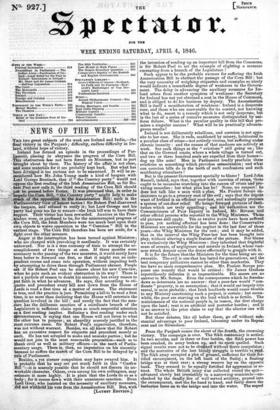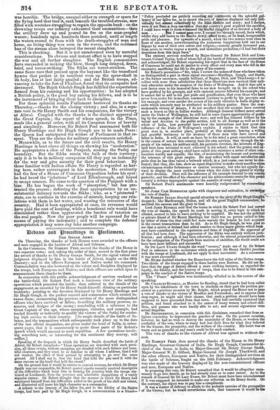From the Punjaub comes the shout of the fourth, the
crowning victory. The campaign is over. The Sikh contumacy is settled. In two months, and in three or four battles, the Sikh power has been crushed, its army broken up, and its spirit quelled. Such signal results were not to be obtdned without fierce compulsion ; and the narrative of the last bloody struggle is terrible to read. The Sikh army occupied a plot of ground, sufficient for their for- tified encampment, on the left bank of the Sutlej ; a floating bridge was at their rear; a strong reserve lay on the opposite bank. They seemed to be equally fortified for aggression or re- treat. The whole British army was collected round the spot— advanced slowly but irresistibly in a narrowing semicircle—un- checked by the deadly fire of well served artillery, poured into the encampment, met the foe hand to hand, and fairly drove the barbarian force on to the bridge and into the water. The sequel
was horrible. The bridge, unequal either iu strength or space, for the flying herd that trod it, sank beneath the troubIedstream, new filled with wretches struggling to regain the opposite bank : on the drowning troops our infantry exhausted their ammunition—then the artillery drew up and poured its fire on the man-peopled waters ; hundreds upon hundreds there perished, until at length the waters ceased to foam with the death-struggles of man and horse, no living thing was seen in the waves, and the reddened hue of the stream alone betrayed the recent slaughter. This is shocking. But it is not unredeemed even by merciful considerations. Its obvious and instant effect is to have stopped the war and all further slaughter. The English commanders have succeeded in making the blow, though long delayed, fierce, brief, and terror-striking. The Sikhs are terror-stricken. The same fierce race that pressed upon the bayonet like the transfixed hyena that pushes at its assailant even up the spear-shaft in its body, has at last fairly quailed ; and the British troops, ad- vancing to take the fort of Phulloor, found that its occupants had decamped. The Rajah Gholab Singh has fulfilled the expectation formed from his cunning and his opportunities: he has adopted a British policy, is the good boy among his fellows, and is to be the instrument of bringing them back to discipline. For these splendid results Parliament bestowed its thanks on Thursday,—thanks for the closing victory; and also, in a sepa- rate vote to Sir Henry Smith and his companions, for the victory at Aliwal. Coupled with the thanks is the distinct approval of the Great Captain ; the report of whose speech, in the Times, reads like a general order, with all its Ca3sarian force of brevity and simplicity. Moreover, Sir Robert Peel announced both Sir Henry Hardinge and Sir Hugh Gough are to be made Peers : the Queen had anticipated the wishes of Parliament in that re- spect. Thus are the claims for military achievements satisfied.
Meanwhile, as to the future and the civil results, Sir Henry Hardinge is bent above all things on showing his "moderation." He appropriates a slice of the Punjaub, making the Sutlej our boundary. But the Sikhs retain the bulk of their territory ; only it is to be in military occupation till they pay an indemnity for the war and give security for their good behaviour. By those familiar with Indian affairs Sir Henry is regarded as hav- ing been rather extravagant in his moderation. He evidently had the fear of a House of Commons Opposition before his eyes : he had heard the "jobations" of Lord Ellenborough, and hoped to escape censure. He came to the question of the Punjaub with a _bias:. He has begun the work of "absorption," but has pro- tracted the process ; deferring the final appropriation by an un- substantial delicacy towards the Sikhs ; who, as a " protected " state, are to continue in the exercise of misrule, keeping our rela- lations with them in hot water, and wasting the resources of the country. Had it been appropriated at once, its revenues would have paid the cost of keeping, while a beneficent rule would have diminished rather than aggravated the burden of taxation on the real people. Now the poor people will be squeezed for the means of paying the indemnity ; and to complete the deferred appropriation it may some day take another campaign.



























